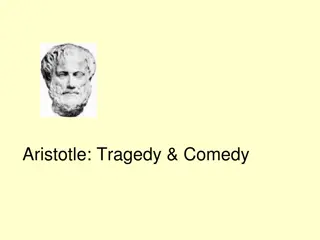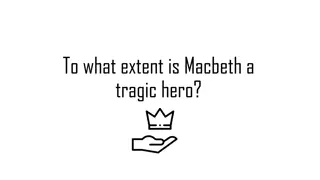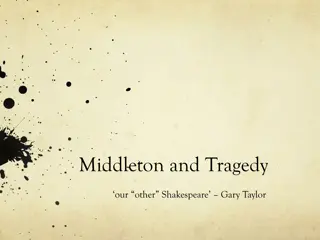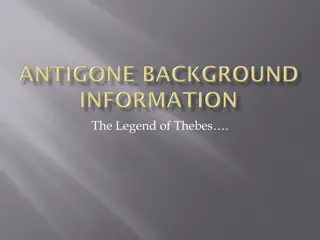Understanding Aggression and Violence: Theories and Influences
Exploring the concept of aggression, this content delves into various theories surrounding aggressive behavior, such as the Biological, Frustration, and Learned Social Behavior perspectives. It also touches on influences on aggression like aversive incidents, arousal, and media influence, while prop
1 views • 45 slides
Aristotle's The Poetics: Tragedy and Comedy Analysis
Aristotle, the Greek philosopher, introduced key concepts in his work The Poetics, focusing on tragedy and comedy. He countered Plato's views on literature and emphasized the importance of imitation, catharsis, and the unity of time, place, and action in dramatic composition.
0 views • 32 slides
Analyzing Macbeth: Tragic Hero According to Aristotle
Delve into the complexities of Macbeth's character as a tragic hero through Aristotle's definition of tragedy. Explore the significance of unified action, character traits, and the concept of catharsis in understanding Macbeth's journey from good fortune to tragic downfall.
0 views • 16 slides
Facilitator's Guide for How to Synod for Youth
This facilitator's guide explores the concept of youth in the Church, highlighting the importance of listening to young people and fostering their contributions. It delves into the goals of engagement, the role of the facilitator, communication strategies, and the significance of journeying together
0 views • 29 slides
Tragedy in Renaissance England: A Comparative Analysis of Shakespearean Influences
Tragedy in Renaissance England was influenced by classical Greek and Roman models as well as late medieval works like those by Seneca and John Lydgate. Shakespeare and his contemporaries drew inspiration from these sources, creating intense explorations of suffering, evil, and the fall of exceptiona
3 views • 16 slides
Greek Tragedy: From Oedipus Rex to Sophocles' Legacy
Greek tragedy, rooted in societal changes of Greek culture, explores the arrogance of tragic protagonists like Oedipus. The form and structure of tragedies aim to evoke catharsis in audiences through a journey of fear and emotions. Playwrights like Aeschylus, Euripides, and Sophocles contributed dis
0 views • 13 slides
Unveiling Shakespearean Tragedies: The Path of the Tragic Hero
Delve into the world of Shakespearean tragedies and explore the characteristics of the tragic hero, from Hamartia to catharsis. Discover how the downfall of these powerful figures leads to cathartic experiences for audiences, invoking emotions of pity and fear. Uncover the defining elements that mak
0 views • 18 slides
Introduction to Greek Tragedy and Tragic Heroes
Explore the elements of Greek tragedy including the role of the chorus, the concept of fate, and the characteristics of a tragic hero like facing fate with strength. Discover iconic tragic heroes like Zorro, Anakin Skywalker, and Batman, examining qualities such as hubris and experiencing catharsis.
0 views • 17 slides
Insights into Elizabethan Tragedy and Classical Influence in Drama
Explore the world of Elizabethan theatre, the influence of classic Latin drama, and the evolution of tragedy from the 16th century to modern times. Learn about the elements of tragedy, the shift in tragic heroes from kings to middle-class individuals, and key concepts like hamartia, nemesis, and cat
0 views • 7 slides
Understanding Tragedy in Literature
Exploring the essence of tragedy in literature, this content delves into definitions, terminology, and elements of tragic plays. It covers concepts like catharsis, hamartia, and the characteristics of Shakespearean tragedy, offering insightful perspectives and prompts for analysis.
0 views • 6 slides
Aristotle's Tragic Theory: Elements and Concepts Explained
Explore Aristotle's analysis of tragedy, including the six parts of tragedy, the definition of catharsis, the characteristics of a tragic hero, the concept of hamartia, and the comparison between epic and tragedy. Delve into the essence of tragedy as a medium for purging emotions and moral enlighten
0 views • 10 slides










